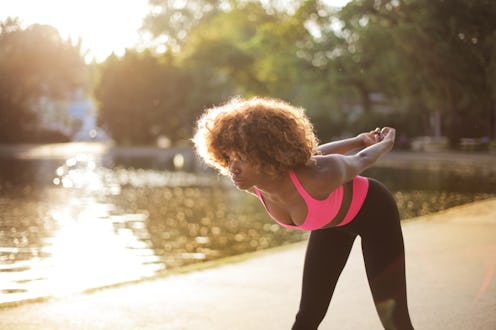
From tennis champion Venus Williams to Olympic soccer player Kara Lang, more and more athletes are opting for a planet-based diet. If you're curious about how to go vegan if you work out, you're not the only one.
A study published in the journal Nutrients noted that athletes who eat a plant-based diet can lower their risk for heart disease, reduce cholesterol and inflammation, and increase the amount of oxygen that reaches muscles. This in turn can improve both endurance and performance. So, just what foods should you be eating to up your game while also getting proper nutrition?
"To get enough protein to support an active lifestyle, those following a vegan diet have to eat plenty of beans, legumes, nuts, seeds, and grains. Two to four servings per day of protein is a good rule of thumb to follow to meet the requirements for necessary amino acids," Stephanie Papadakis, M.A., N.C., a holistic nutrition consultant and founder of Gut of Integrity, tells Bustle. "However, if you are very active, your body may need more. In general, people need 0.8 grams of protein per 1 kilogram of weight. Those who are really active could need up to 1.4 kilograms of protein per 1 kilogram of weight in order to maintain their muscle mass."
Papadakis says that in addition to eating the aforementioned foods, you can also supplement with organic vegan protein powders (some of my faves that actually taste great are from Amazing Grass and Nutiva). She also recommends chlorella and spirulina because they contain all nine essential amino acids and are easily utilized by the body.
Because some some nutrients your body needs aren't found in abundance in plants, Keri Gans, a registered dietitian and nutritionist, tells Bustle that a vitamin B supplement, such MegaFood Methyl B12, that contains the active form of vitamin B6 as well as methylated forms of folate and B12, is advised. "B vitamins are important as they support the healthy formation of blood cells and provide mental energy," she says.
Papadakis adds that if you're not preparing your own meals and can't be sure you're getting enough macronutrients from food alone, it's also important to take vitamin D, iron, and omega-3 fatty acid supplements to ensure you're getting the proper nutrients your body needs to perform at peak levels. If you're not getting enough nutrition to support your workouts, you'll notice some signs that you need to make adjustments.
"If your hair and nails look brittle, if you feel weak, if you notice you’re losing weight from muscle mass, or you’re prone to catching colds — all of these are signs you aren’t getting enough protein. If that’s the case, start adding more protein into your diet at every meal," Papadakis says.
In general, being a vegan athlete means learning about which nutrients your body needs to thrive and how to make sure you get them. If you're new to veganism, it definitely requires a shift in mindset when it comes to meal prep. But the good news is that it's 100% possible.